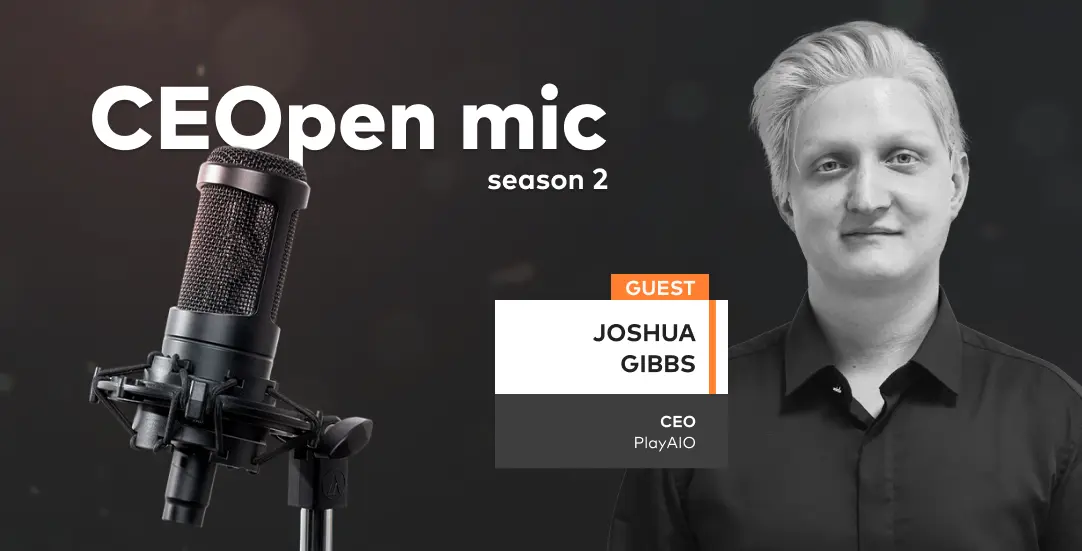A data-driven startup’s journey in the iGaming industry

The iGaming industry is awash in buzzwords – AI, machine learning, big data, Web3 – but how much of it translates to real, actionable results? Josh Gibbs, founder of PlayIO, a nine-month-old startup simplifying data for better decision-making in the gaming sector, sheds light on this crucial question in a recent podcast interview. This blog post unpacks his insights, covering everything from data-driven decision-making to the realities of securing seed funding in a competitive market.
Part 1. Data-driven decisions – Beyond the hype
Josh emphasizes that the true value of technologies like AI and Web3 lies not in the buzzwords themselves, but in their underlying computational power. He likens the shift to Web3’s computational capabilities to the evolution from manual calculations to spreadsheets – a significant leap in efficiency. AI, in his view, isn’t about revolutionizing the industry, but about streamlining repetitive tasks, freeing up human capital for strategic thinking and action. This is particularly relevant in iGaming, where the sheer volume of data can be overwhelming. PlayIO helps operators cut through the noise, focusing on key issues and providing clear, understandable solutions.
Part 2. Navigating the data landscape – Challenges and opportunities
A key example? High-value player management. Instead of relying on reactive customer service tickets, PlayIO leverages data analysis to proactively identify and address player concerns, providing real-time support that mirrors the personalized attention of a VIP casino host. This proactive approach is crucial for maximizing player lifetime value and minimizing churn. Josh highlights the stark contrast between this data-driven approach and the current industry standard of delayed jackpot payouts and reactive ticketing systems. He advocates for integrating VIP management, CRM, and customer service systems for a truly holistic approach.
The industry, Josh points out, is still in its early stages of data utilization. Many operators talk a big game about data, but lack the infrastructure and processes to effectively gather and utilize it. The path to effective data utilization requires a top-down approach, starting with identifying core problems before implementing solutions. Game recommendations, for instance, should be a final step, not the initial focus. Prioritizing understanding player value, optimal bonus allocation, and churn prediction is paramount.
Part 3. The fundraising rollercoaster – Lessons from the trenches
Securing seed funding for PlayIO, even with a strong product and a clear vision, wasn’t a walk in the park. Josh shares his candid experiences, highlighting the challenges of bootstrapping a startup and the realities of investor relations. He emphasizes the importance of resilience, a strong belief in your product, and a laser focus on market differentiation. He reveals the arduous process of securing funding, involving countless emails, meetings, and pitches, with a low conversion rate. He stresses the importance of understanding investor motivations – distinguishing between product-led and financially-led investors – and tailoring your pitch accordingly.
Josh’s advice to aspiring entrepreneurs is invaluable:
- No one cares about your product more than you do. Believe in your vision and be prepared for rejection.
- Narrow your focus. Don’t try to be everything to everyone.
- Seek critical feedback. Even if your product is amazing, get external perspectives.
- Understand your investors’ timeframe. Misaligned expectations can lead to conflict.
- Choose your investors wisely. A synergistic partnership is more valuable than just the money.
Part 4. Building a high-performing team – A data-driven approach
Josh’s approach to building his team is as data-driven as his product. He emphasizes the importance of building a core team of trusted individuals who embody the company’s ethos of hard work and transparency. He prioritizes finding the right fit over maximizing qualifications, valuing practical experience and passion above all else. He uses readily available data from tools like GitLab and Linear to track performance and make data-driven decisions about employee evaluation and retention. This approach, he argues, allows for rapid scaling and avoids the bottlenecks often associated with larger, more bureaucratic organizations.
A data-driven future for iGaming
Josh Gibbs’ journey with PlayIO offers a compelling case study for data-driven decision-making in the iGaming industry. His insights into both the technical challenges and the fundraising rollercoaster provide valuable lessons for entrepreneurs and investors alike. The future of iGaming, he suggests, lies not in empty promises of AI-powered revolutions, but in the practical application of data to create personalized, engaging, and ultimately profitable experiences for players.
This article is based on an episode of the CEOpen mic podcast. For the full conversation and more insights, tune in to CEOpen mic on YouTube and Spotify – don’t forget to subscribe so you never miss an episode!




















